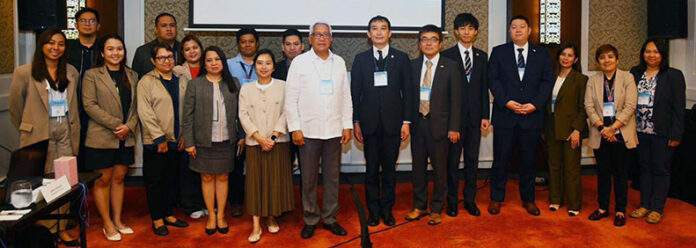
-
The Department of Transportation called on concerned government agencies and the private sector to rally together to address challenges in the cold chain sector
-
DOTr officer-in-charge International Cooperation Division Jasmin Marie Uson made the call during the recent 3rd Philippines-Japan Logistics Policy Dialogue and Cold Chain Logistics Workshop
The Department of Transportation (DOTr) is seeking a united front to address challenges in the cold chain sector and realize a more vibrant logistics industry in the Philippines.
DOTr officer-in-charge International Cooperation Division Jasmin Marie Uson called on concerned government agencies and the private sector to rally together during the recent 3rd Philippines-Japan Logistics Policy Dialogue and Cold Chain Logistics Workshop held together by DOTr and the Ministry of Land, Infrastructure, Transport, and Tourism (MLIT) of Japan.
The dialogue provided a platform for a more interactive exchange of views and information on logistics at the governmental level and also “deepened the understanding of the current logistics landscape and identified the challenges faced by both the Philippines and Japan,” the DOTr said in a statement.
DOTr undersecretary for maritime Elmer Francisco Sarmiento highlighted the transport department’s commitment to widen the transportation sector’s impact by ushering Filipinos towards a comfortable, accessible, safe, sustainable, and affordable transportation system and to expand continuous collaboration for logistics, cold chain, and related industries.
Presentations were made on the Philippines’ and Japan’s logistics policies and initiatives for the promotion of cold chain logistics. It was followed by discussions among the participants from various national government agencies, namely the Civil Aeronautics Board, Land Transportation Office, Department of Agriculture, Department of Trade and Industry-Bureau of Philippine Standards, Department of Public Works and Highways, Bureau of Customs, DOTr-Planning and Project Development Office, and DOTr International Cooperation Division.
The policy dialogue was followed by a cold chain logistics workshop, which was attended by over 100 participants from various national government agencies, cold chain associations, and logistics companies.
To promote understanding of the significance of cold chain logistics, the workshop included presentations from leading companies in the field of cold chain logistics and certification bodies for cold chain logistics standards.
According to University of Asia and the Pacific senior agribusiness specialist Florence Mojica-Sevilla, who was consultant for the Board of Investment’s Philippine Cold Chain Industry Roadmap, demand for cold chain has been increasing yearly, with both imports and exports of key products recording growths from 2010 to 2019.
She said growth prospects come from food delivery services, convenience stores’ take-away meals, local food production requiring cold chain logistics services, vaccines and other temperature-sensitive drugs, and e-commerce and online grocery shopping.
Also driving demand are people’s preference for just-in-time delivery; the trend for integrated end-to-end supply chain logistics; oversupply of some cash crops; and the county’s continued dependence on food imports.
Barriers to expansion of the industry, meanwhile, include the limited awareness on food safety and misconception about frozen products; low demand for cold chain logistics services in some areas; lack of local government unit (LGU) support for cold chain investment; LGU regulations; product seasonality; limited infrastructure/road network support; traffic; and the African Swine Fever affecting meat production in the country since last year.
Other identified industry “weaknesses” include insufficient cold storage capacity especially outside Metro Manila; shortage of logistics and trucking services; lack of trained workers; difficulty complying with required documentation for accreditation; high energy/power costs; weak internet connectivity; high investment requirement; limited information on cold storage services; and lack of coordination within government agencies involved in shipments.
The cold chain roadmap, launched in 2020, targets a 10% to 15% increase in cold storage capacity annually, or 50,000 pallets more each year, to serve the increasing needs of various industries.
READ: PH cold chain roadmap eyes up to 15% annual capacity growth




